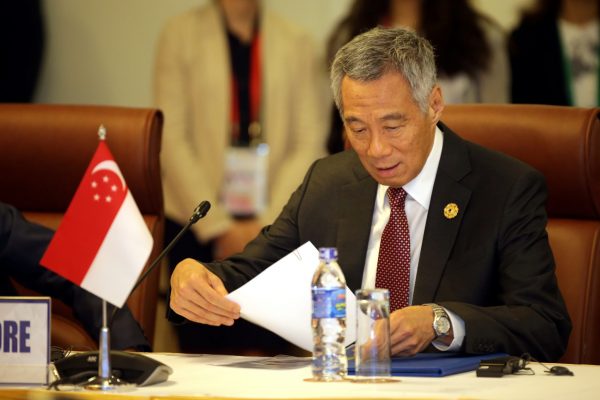Both internal and external political forces are buffeting ASEAN members. On the one hand there is the growing influence of different major powers in Southeast Asia such as China and India and their diverse domestic influences in various ASEAN member states. On the other there is the still important but uncertain role of the United States in Asia.
Such developments call into question ASEAN’s continued relevance and unity. Unfortunately, Lee offered little in the way of concrete responses to the changing circumstances he sketched out, whether for ASEAN or for Singapore.
An important area of tension that Lee pointed out is ASEAN’s longstanding focus on consensus. Lee sees this ‘laborious’ process of finding ‘common ground’ as fundamental to enabling the group’s diverse members to move forward together on issues like trade liberalisation, economic integration and the management of territorial disputes (for instance in the South China Sea).
But recent initiatives by China and India to gain influence in Southeast Asia, alongside radical departures from past precedent in US approaches to foreign policy, are pulling ASEAN members in disparate directions. Responses to these cross-cutting dynamics — often guided by domestic considerations — make intra-ASEAN consensus much more difficult to attain. Projects such as China’s Belt and Road Initiative and the United States’ ‘Free and Open Indo-Pacific‘ idea may move ASEAN members in different directions well before any consensus can emerge.
A related concern is the competition for influence from alternative regional arrangements and external powers — a process Lee described as ‘Darwinian’. Even if not explicitly stated, this word choice implies that Lee may be conceding that ASEAN risks extinction if it cannot adapt to the changing circumstances. For the ASEAN project to persist, Lee said, ASEAN members ‘must come together to maintain relevance and cohesion’.
Yet, given that ASEAN’s ability to sustain cohesion is undergoing unprecedented internal and external pressure, the organisation faces a real risk of marginalisation, maybe even irrelevance. Major powers active in the region are beginning to offer alternative institutional arrangements that may ultimately prove more attractive to some of the group’s members.
While the frank assessment of ASEAN’s current difficulties is welcome, Lee provided few clear, practical responses to these issues. The few goals Lee laid out are largely aspirational. He called on ASEAN governments to look beyond immediate domestic considerations, trust in past experiences of cooperation and commit jointly to the ASEAN project.
Within these parameters, Singapore — as current ASEAN chair — will seek to move member states to strengthen existing frameworks for political, economic and socio-cultural cooperation with a focus on resilience and innovation. This includes advancing existing economic proposals such as the Regional Comprehensive Economic Partnership and the ASEAN–EU Comprehensive Transport Agreement. Even then, progress on these issues will be trying, owing to a ‘growing mood of nationalism and protectionism’ that is on the ascent in many countries.
Lee called on ASEAN governments to make bold decisions based on enlightened, long-term considerations to improve livelihoods. Noble as such goals may be, one wonders what such considerations mean in terms of concrete policies. After all, it is unlikely that any government will admit to making policies based on timidity, benightedness and short-term conveniences that are detrimental to livelihoods.
There is also the matter of how the Lee administration aims to get other ASEAN governments and partners on board with its vision before a new Singaporean leadership takes over, possibly by 2022. This in turn raises the more pedestrian but perennial issue of improving long-term intra-ASEAN coordination across issue domains given member states’ preferences for an institutionally weak secretariat and secretary-general. Adequately addressing these institutional factors may well be crucial in moving Lee’s hopes for ASEAN closer to reality.
Lee reiterated that ASEAN is of critical importance to Singapore and its future. This suggests that Lee views the global political trends he discussed as having a direct effect on Singapore, its interests and external outlook.
But it is on Singapore’s relationship to the region and how Singapore’s foreign policy fits within this context that Lee is vaguest. He echoed Singapore’s former deputy prime minister Goh Keng Swee in calling for a ‘delicacy of perceptions’, where academia and business weigh in on critical issues of the day to help inform the decisions of professional bureaucrats and political appointees. But Lee left how this ‘delicacy of perceptions’ should play out or what kinds of policy directions Singapore should follow unexplored.
While Prime Minister Lee presented a refreshingly honest outlook on ASEAN’s uncertain future, he did not offer much more than an uncertain policy approach to match.
Ja Ian Chong is Associate Professor in the Department of Political Science, National University of Singapore.


Issues like conflicting claims in the South China Seas and RCEP take time to resolve. There is value in persistence and patience!
I feel confident Asean will settle the South China Seas claims one day.